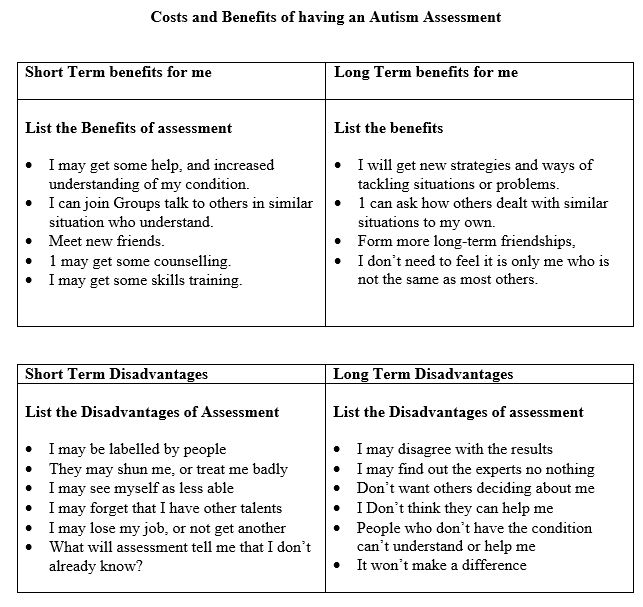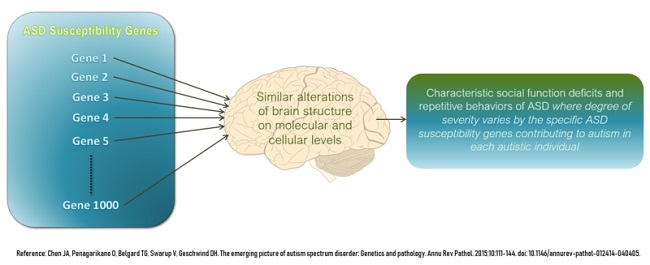Positive Health Online
Your Country

High Functioning Autism in the Workplace
listed in mind matters, originally published in issue 281 - September 2022
Lots of adults with high-functioning autism go through life without ever having a diagnosis. They may be thought of by colleagues as just like anyone else but a bit ‘quirky’ or different in their thinking or behaviour. They can be intelligent, funny, do high functioning jobs and reach high positions in society. They can be creative, talented and kind and also experience difficulties with colleagues, social communication and interaction, Unexpected change or new situations can seem overwhelming and anxiety provoking and may cause the autistic person distress.
What Is Autism?
Autism is a lifelong developmental disability which affects how people communicate and interact with the world. One in 100 people are on the autism spectrum and there are around 700,000 autistic adults and children in the UK.
National Autistic Society
Autism genes have similar downstream effects on brain development
Courtesy Wikipedia
Media Portrayal
There has been a lack of understanding of autism in the media, with television shows which stereotype autistic people as either confused anxious dullards or mathematical genius with no awareness of other people’s sensitivities. There is not the blending of a range of different personalities, abilities and human makeup as is seen in the ways that the rest of the human population is portrayed.
‘Love on the Spectrum’ television series is an exception, which gives a glimpse of the anxiety of first time dating. It sets up dates with hobby and interest compatible autistic young adults, shows the anxiety of speed dating nights and helps with loosening up questions when the teen daters become tongue tied. The programme is good natured and warm and has experts coaching the daters through first meeting nerves. The programme goes all out to help these young Australians transition to the really important next stage in life - finding a compatible date.
Neurotypical and Neurodivergent
The word Neurotypical is used to refer to someone who has typical neurological development or functioning and acquires physical, verbal, intellectual and social skills at a similar pace that meets developmental milestones at similar points to the majority of the population.
The term ‘Neurodivergent’ is a newer more holistic less stigmatizing ways of describing autism spectrum disorders such as autism, dyslexia, dyscalculia, attention deficit hyperactivity disorder (ADHD) and obsessive compulsive disorder (OCD). It recognises everyone’s unique abilities and considers neurological differences to be the result of variations in the human genome.
Autism is a Lifelong Condition
It is important to recognize that autism is a lifelong condition, a way of thinking and seeing people and the world which is different to the typical person.
All autistic people share certain difficulties which can make social interactions, communicating and problem solving anxiety provoking and overwhelming. However being autistic affects different people in different ways it is not a ‘one size fits all condition’.
People who are autistic may be treated differently by others, be excluded, or stigmatized, whereas with the right help and learning environment they can be helped to feel safe and reach their full potential.
Greater understanding of autism among families, employers and people around the autistic person can help the person feel safe and cared for and give a good environment for them to feel accepted and grow.
Children and Early Intervention
Children are more likely to be picked up and receive intervention through the health, welfare and education systems. Parents or carers wishing to get help or a diagnosis for their child can refer to their GP or to the Special Education Needs Coordinator, SENCO at school for an assessment to identify autism.
Identifying Autism Disorders, i.e.
Asperger’s is a developmental disorder on the Autistic spectrum. It is less severe than classic autism. Children with Asperger’s display difficulty relating to others socially, their thinking and behaviour can be restrictive but they have good language skills.
Having a Formal Diagnosis of Autism in Childhood can Offer the Child
- Help and encouragement in the form of psychological understanding;
- Staff and key workers that understand their condition and how to help them;
- A chance to be taught in a safe environment by people who understand their needs and can teach thinking and behavioural strategies to help autistic children reach their potential in life.
Adults may not want or see a need to seek assessment
And whatever they decide is the right decision for them.
There are believed to be 1m adults with autism in the UK, roughly 2 per hundred adults, and numbers are growing but this is not necessarily seen as an increase in numbers but that we are getting better at recognising the signs of autism spectrum disorder.
UK, 2020 – Office for National Statistics
Adults with hidden autism are in every workplace. They may struggle in silence, work harder and longer than anyone else to be seen as competent, hate social engagements and making small talk with colleagues and be reluctant to seek a diagnosis of autism for many reasons:
- They don’t want the certainty of knowing they have autism as the label may change their perception of how they see themselves and their identity. ‘And once the genie is out of the box, you can’t put it back again’;
- A person being diagnosed as having autism may feel ‘there is a stigma attached to the label’;
- A diagnosis of autism, although a person may suspect it, ‘changes people’s perception of how they see themselves in relation to feeling capable and connecting to others in the world’. They may worry about how their employers, work colleagues, partners may view them differently if their label is disclosed;
- People may be reluctant to seek a diagnosis because they may view autism as a mental health problem, rather than in a holistic way of being a person who thinks differently and might need some help and support with strategies;
- They may say, there was no help when I was growing up I had to sort my own problems out. I have found what suits me and am happy with my lot!
Getting an Adult Assessment and Diagnosis
- Talk to other people who are close maybe family or GP;
- if you can’t decide then this checklist might help you gain some clarity.
(Draw a line down the centre of a page and list your own examples of what you consider the costs and benefits of having an assessment – the ones listed below are just examples.)
Costs and Benefits of having an Autism Assessment

Consider your Decision over a Couple of Weeks or Longer
Having an adult assessment is not something people do lightly, there are often precipitating factors before an initiating action. It may be finding out your child is autistic, re-occurring relationship difficulties, or an upset or breakdown at work.
Whether you decide to have an autism assessment or carry on as before it is worth considering all the good and bad points before taking any action.
Difficulties of Getting an Adult Assessment.
It is not always easy to get a diagnosis for autism; assessment can in cases take years. People can initially approach their GP for a referral on for a formal diagnosis or to the National Autistic Society for advice and if they wish to go further, the society can offer people an assessment quiz. If a person wishes for a quicker diagnosis and can afford it they can ask for a private assessment.
What a Formal Assessment gets you as an Adult is Structure
What an assessment gives is more clarity on where, or if, you fit on the autistic spectrum. Clinicians can evaluate you and the kind of support you need. People vary so much in their range of autistic thinking and behaviours it means there are no one size fits all answers to their autistic problems. What an assessment gives you is an indication of triggers and likely regular sticking patterns and areas where you can benefit from having more understanding, support and training in tackling problems.
See National Autistic Society website for advice and help on aspects of autism.
Comments:
-
No Article Comments available
